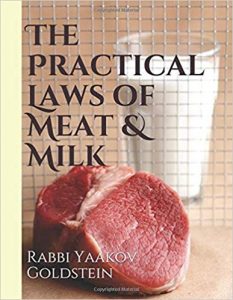
May one cook food in a Treif pot for the sake of a gentile?
- One works as a caretaker in the home of a gentile. The gentile asks the Jewish caretaker if he can heat up milk in a pot for him. Now, the gentle’s pots are used for both meat and milk. May he nonetheless heat milk in the Treif/meat pot?
Cooking meat or milk in the pot: If the pot is Ben Yomo of meat[1] use [was used for cooking beef within 24 hours], then it is Biblically forbidden to cook milk products in it even for the sake of a gentile, and even if one is using the gentile’s pot and ingredients.[2] [Thus, in the above case scenario, the Jew would have to tell the gentile to place the pot on the burner and turn on the flame under it.[3]] If, however, the pot is not Ben Yomo, then it is permitted to cook milk in it for the sake of a gentile.[4] Nevertheless, it is proper to be stringent even in such a case.[5] This especially applies if one is unsure if the pot was used for meat/milk within the past 24 hours.[6]
Pareve non-Charif foods: From the letter of the law, one may cook non-Charif Pareve foods in the Treif pot, even if it is Ben Yomo of Basar Bechalav use.[7] Nonetheless, it is a stringency to avoid doing so.[8]
A Davar Charif: It is seemingly forbidden to ever cook a Davar Charif together with meat in a dairy pot even if it is not-Ben Yomo.[9] The same applies vice versa. Accordingly, it is a stringency to never cook a Pareve Davar Charif food in the pot of a gentile, even if the pot is not Ben Yomo.[10] [Thus, in the above example, if the gentile asked the caretaker to make him fried onions, he should have the gentile turn on the flame.]
_________________________________________[1] This refers to meat of a Kosher animal.
[2] Peri Megadim 87 S.D.18; Machazik Bracha 87:22; Zivcheiy Tzedek 87:44; Kaf Hachaim 87:14 and 59
[3] See Admur 253:27; M”A 253:41, that although we rule in Beitza 34a that if on Shabbos one places the pot on the fire and another turns on the flame, only the second person is liable, it is nevertheless, Rabbinically forbidden. Hence, seemingly, here as well the gentile is to both place the pot on the flame and turn it on.
[4] Chamudei Daniel 87:18; Pischeiy Teshuvah 87:8; Zivcheiy Tzedek 87:17; Kaf Hachaim 87:23;
The reason: As the Sages did not extend their decree against cooking to a case where the mixture would only be Rabbinically forbidden, and there is no worry of Maaras Ayin in this case as the onlooker does not know whether the pot is dairy or meat. [Poskim ibid]
[5] Pischeiy Teshuvah 87:8
[6] Rama 87:6 brings in name of Mordechai to be stringent not to even raise the flames under a non-Kosher pot, and hence certainly this applies here even though in general we rule that an unknown vessel is assumed to be not Ben Yomo.
[7] P”M 87 S.D. 18
The reason: As even if the pot contains Ben Yomo Basar Bechalav taste due to a prior cooking, there is no prohibition of cooking Basar Bechalav involved in causing the Basar Bechalav taste to enter into the food he is now cooking for the gentile.
[8] Rama ibid and Shach 87:18 in name of Mordechai;
[9] The reason: As since a Davar Charif is viewed as “Beiyn” it is like one is actually cooking the milk and meat together.
[10] The reason: As the onions extract Beiyn taste of meat and milk into the onions and it hence ends up recooking the Basar Bechalav. Nonetheless, this matter is a mere stringency, as explained in the Rama and Poskim ibid, as it is not considered Derech Bishul.



Leave A Comment?
You must be logged in to post a comment.